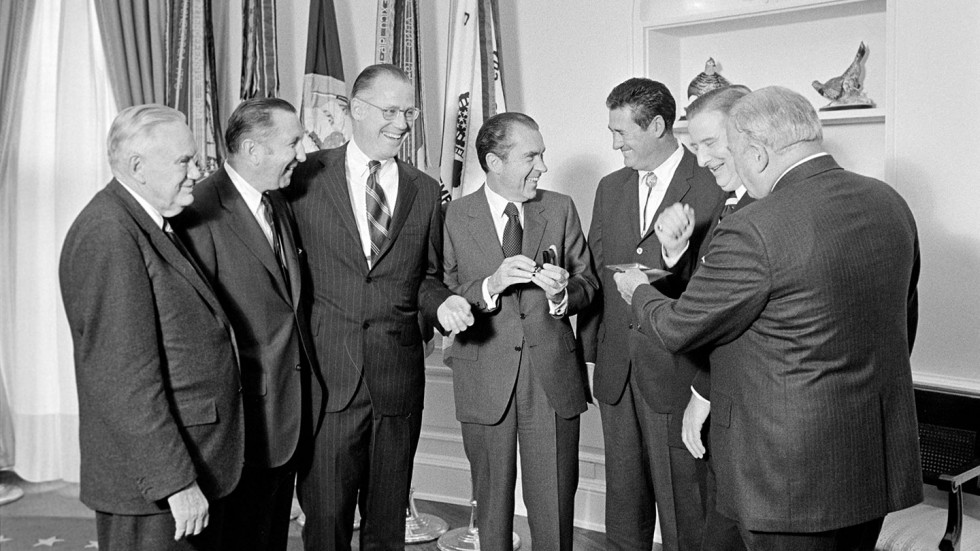Introducing President Kornfeld
20 things to know about Kenyon’s twentieth president that you won't find on her resume.
Read The StoryDiving into “The Wingmen,” a new book by Adam Lazarus ‘04.
As is the case for many Kenyon alumni, a book Adam Lazarus ’04 encountered during his college days changed his life and altered his career path.
It was just before the start of his junior year, in 2002, and he showed up to Gambier early for football practice. He had brought along a copy of “The Boys of Summer,” Roger Kahn’s classic account of the 1950s-era Brooklyn Dodgers, begun reading it, and become instantly entranced.
“I read it during preseason,” he remembered, “and that was kind of the point where I was like, ‘This is what I want to do with my career.’ That year, I read every single Roger Kahn book.” For a number of years before this, Lazarus had ambitions to become a baseball or football beat writer. While that never happened the way he planned, he took an interest in history books, with Kahn’s masterpiece on his personal pedestal.
While Kahn’s book was set in the sports world, it was really more about looking into the humanity of those legendary Dodgers players and examining the lifelong relationships they forged during the vastly different eras of their heydays and post-playing careers. These same themes echo throughout Lazarus’ latest sports history book, “The Wingmen: The Unlikely, Unusual, Unbreakable Friendship Between John Glenn and Ted Williams,” published by Kensington/Citadel Press in August.
While scrolling through Twitter on Veterans Day 2020, he came across a photo of Ted Williams and John Glenn in animated conversation while serving during the Korean War. Knowing they both had served but not realizing they’d been in the same squadron, he learned, as he read up on their lives, that they had flown several missions together, and that camaraderie formed the basis for a lifelong mutual admiration society that went much deeper than simply being war buddies.
“Once I realized that their relationship (was) not constant, but it continued all the way to the day Williams died, I knew there was a story here,” he said.
While the Boston Red Sox icon was principally known for his baseball feats, the epic nature of Williams’ story meant that a book could be written about his military exploits and life away from the field, while tangentially touching on his career on the diamond.
Lazarus explained that if he had written a book that promised to be an exploration of the personal relationship between these two titans and then filled it with digressions about Williams’ baseball feats or Glenn’s NASA training, it would’ve felt like cheating the reader. “I wanted to take well-known figures and tell the lesser-known parts of their lives,” he said.
This also was his biggest challenge, because summing up Ted Williams as a person was about as easy as trying to sneak a fastball past him as a hitter. It often seemed like half of Williams’ personality traits existed just to conflict with the other half. According to Lazarus, the Splendid Splinter was “the most complex individual I’ve ever studied.” He was — at different moments — kind, wrathful, arrogant, compassionate, profane, charitable, boorish and intellectual. Sometimes all of that within the span of a few minutes. Perhaps the most succinct way to sum up Williams is a quote Lazarus included in the book from an anonymous marine: “Ted Williams — he doesn’t make friends easy, but when he does it is all the way.”

It made for a fascinating relationship of contrasts with Glenn. “He was everything that people remember. You look up integrity in the dictionary, there should be a picture of John Glenn,” Lazarus said. “Of all the subjects I’ve written about, he seems to have been the most genuine good person. He lived up to everything — ‘the clean Marine Boy Scout,’ (as) they called him in ‘The Right Stuff.’”
While researching the book, Lazarus got a fuller sense of their relationship through interviewing Glenn’s two children, Williams’ surviving daughter and three pilots who flew with both men, among others. The friendship reminded Lazarus of his own longtime connection with a Kenyon friend, Mike Ferzoco ’04, who is markedly different from him in numerous ways: “We don’t talk all the time. We talk on the phone maybe once every four months. I’ll see him at Reunion, maybe I’ll see him when one of us is in the other city. But when we get together or we’re on the phone, we might as well be in our dorm room in Manning,” he noted.

In writing about these two transcendent figures, Lazarus joined a roster of impressive peers. The challenge of capturing Williams on the page has been ably taken on by literary heavyweights from John Updike to Richard Ben Cramer to David Halberstam. Writing about Glenn, meanwhile, meant joining the company of Tom Wolfe. But Lazarus kept his focus on telling the story of Glenn and Williams’ Korean War service and their relationship in subsequent decades, combing through unpublished letters, unit diaries, declassified military records, manuscripts and interviews.
Lazarus credits Kenyon’s English and history departments with preparing him well for this kind of work. “You were learning history through literature,” he said. “There was a lot of overlap in that way.”
20 things to know about Kenyon’s twentieth president that you won't find on her resume.
Read The StoryHow Writer-in-Residence P.F. Kluge ’64 and his wife, Pamela Hollie, became surrogate parents to a generation…
Read The Story“There’s very little artifice to the American story when you look at how we treat the dead,” according to…
Read The Story